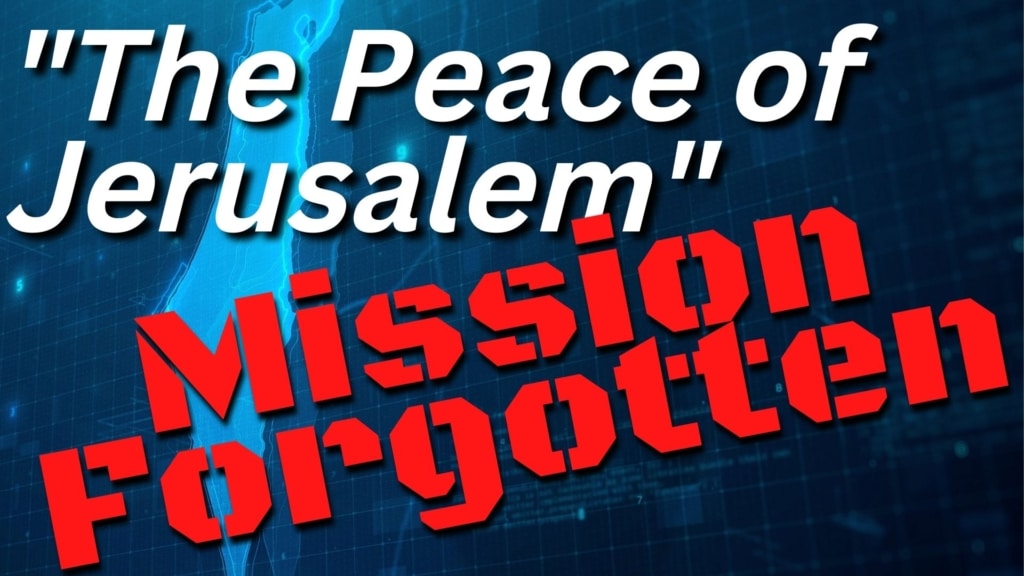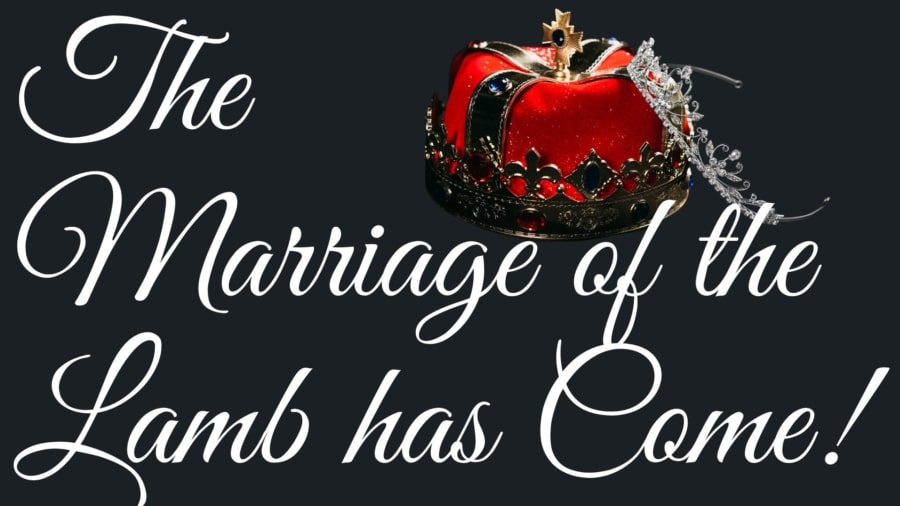This video was posted on YouTube. Please watch it, give it a “Thumbs Up,” share it and subscribe to the YouTube channel to increase its visibility and impact.
We have a few brief hours to embrace an aspect of our mission that I think we’ve largely forgotten, namely, praying for the peace of Jerusalem. What does it mean to pray for the peace of Jerusalem? Jerusalem will never have peace until they recognize the Prince of Peace (Isaiah 9:6). Some we can reach now, in which case they become a member of the Church. Some will not believe until it’s the last hope in a very, very dark, and painful world after the rapture of the Church. Let’s make sure that we have uttered a prayer for that nation. They are surrounded by enemies. They are facing from a human point of view, certain annihilation. You know, Henry Kissinger said in ten years there will be no nation of Israel. That’s the best joke I’ve heard in a long, long time. They will never be driven out. So how can you know? I’m asked this question all the time. How can you know? How can you know that they won’t be driven out and scattered again and things that go on for a thousand years? Well, I have good news and bad news. The good news is they’re there to stay. The bad news is you don’t have another thousand years. We’d like to think that we do. But we are are at the conclusion of our short paragraph in history.
Check out Isaiah 11:11. The prophet foresaw that there would be two dispersions and two returns, and “after the second time” God will re-gather them and then will return. And, folks, it has happened! And He’s coming. Israel is not going to be driven out, but it’s going to be painful in the extreme. A third of those who survive into that time are going to believe (Zechariah 13:8).
We have a mission mandate, and that mandate is to all the nations of the world. But I do believe that there is a specific focus of that mandate and that that aspect of the mandate is with special attention to the children of Israel. Israel is a burning passion in the heart of the impossible and should be to you and me. You remember that Paul in Colossians 1:24 that it was his pleasure “to suffer on their behalf because he was filling up that which was lacking in the sufferings of Christ.” Paul saw very clearly that it was his responsibility as a member of the Body of Christ to continue what His Lord had begun, what Christ came to do. That’s what Paul was here for, and what Christ died for. That was what Paul was willing to die for and therefore to carry on Christ’s ministry. And Paul, in Romans 10:1, we see how he makes this a little bit more specific. “ Brethren, my heart’s desire and prayer to God for Israel is that they may be saved.”
You know, my friends, the Bible commands us to “pray for the peace of Jerusalem” comes from Psalm 122. What does it mean to pray for the peace of Jerusalem? When you and I pray for the peace of Jerusalem, there will be no peace in Jerusalem until Jerusalem and Israel receives the prince of peace. And therefore, we pray for the opening of their eyes. Have you ever thought that a prayer that you utter today could impact the soul of someone who will live in the next dispensation? A thousand years before Christ, David prayed for us in the Psalm 102. This is similar to when Paul says, “My heart’s desire and prayer to God for Israel is that they may be saved.” Don’t you think, Paul, being doctrinally accurate and having the mystery of a new creation revealed to him would just say, “Who cares about them?” And “we’re done with them.” “We’ve moved on to new ground.” A thousand years before Christ came, there was someone praying for you.
David, by the way, often praise as an expression of the trials of Messiah when He would come. I like the way Dietrich Bonhoeffer puts it. He said, “When you read the prayers of David, you are reading the prayers of Messiah, because the prayers that David prayed, Messiah prayed when he was here.” Interesting thought, isn’t it? Psalm 102 is picturing the whole history of the nation of Israel, which is summarized in brief in Revelation Chapter 12, which tells us that “the woman will conceive and bear a child,” and because of that child that she brings, she “will be driven into the wilderness.” The hatred against the nation of Israel that existed in David’s day and the hatred that existed against Israel in the time of Nazi Germany, and that exists today comes from the same source. It’s satanic in origin because Satan still knows that God’s plan for those people is not done. And so Satan stalks to the woman who is in travail. Psalm 102 says in part, “But you all Lord shall endure forever, And the remembrance of your name to all generations. You will arise and have mercy on Zion for the time to savor her. Yes, the time that was set has come.” What time is he talking about? Jesus Christ’s Second Advent, right? The Psalmist continues, “Your glory for the Lord shall build up Zion. He shall appear in His glory. He will regard the prayer of the afflicted. He will not despise their prayer.” Did you get the message that he just said this that is promised is going to happen? “He will not despise their prayer.”
Now, get this, because here is the kicker in Psalm 102:18, “This will be written for a generation to come. There are people yet to be created, may praise the Lord.” Do you see the church there? He’s not just talking about the next generation of Jews. He’s not just talking about another generation. He’s talking about a new people. Generation is often used for race that are race yet to come of people yet to be created. I believe that David here anticipated, and maybe because of something He saw in the writing of Moses, Moses knew there was more to be revealed, but he knew that it was not for the children of Israel, it was for someone else. David knew that the things he wrote would be an encouragement and a strength to a people who did not yet exist. He didn’t know who they were. He didn’t know what they would be called. The idea of church never entered his mind. The concept of being in Christ was beyond his ability to comprehend. Although I would say that of all the prophets of the Old Testament, no one came as close to church age truth as did David in the Psalms. The Psalms are timeless and express the prayers of Christ. I would even be willing to bet that the Lord Jesus Christ had the entire Psalms memorized and uttered each of them at their proper place throughout the time of his pilgrimage on this earth may be continues to pray them. Who knows? He intercedes in our behalf. If David had a concern for a people that would not yet be created, how much concern can you and I have for a people who preceded us?
If the last are going to be first, how great will they be? Paul asked the question in Romans 11 If their casting off is the salvation of the world, what will their reception be but a resurrection from the dead? It’s going to be something amazing. Pray for the opening of their eyes. Our nation is no longer a friend to Israel as we have been. But somewhere there has to be a people that will not only pray for that nation and speak out for that nation, but if necessary, shelter that nation. Those Christians who fought in the resistance for the sake of the Jewish people, they did what the church is supposed to do. And through their dedication and devotion, many, many people of the Jewish nation have come to Christ. Many people will yet come to Christ. How many will come to Christ because you played your part?
Let’s pray that you and I can play the part through our prayers. Stand up for them, be their advocate, be their defender, and above all, be their intercessor. It will make a difference. The priesthood after the order of Melchizedek. See the previous video “I will bless those who bless you – Mission Forgotten” for more detail.
























